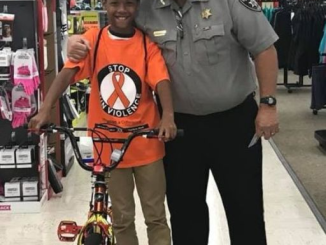
This was supposed to be just another trial shift. The agency sent over a nanny named Shirelle—sweet voice, spotless record, great with the kids. The babies loved her instantly.
All except for Jonah.
He froze the moment she walked in.
Didn’t cry. Didn’t smile. Just stared, wide-eyed, like he was trying to remember something important.
Shirelle sat down, pulled out the cow and pig puppets, started doing the silly farm song. The other babies giggled. Jonah stayed frozen. Then, halfway through the second verse, he whispered something.
Clear as day.
“You left me there.”
Everyone stopped.
Shirelle went pale. Like completely colorless.
I asked Jonah what he meant.
He said it again. “She left me in the yellow room.”
None of the kids at our daycare had ever been in a room like that. We didn’t even have a yellow room. Our place had cheerful colors, sure—blue for the reading corner, green for nap time, pastel pinks and grays. But no yellow. I glanced at Shirelle. Her hands were trembling.
I tried to keep my tone light. “What yellow room, Jonah?”
He looked at her. Just looked. And then, as if his little brain had reached a conclusion, he started crying. Hard. Full-body sobs.
Shirelle stood up quickly. “I—I think he might be overtired. I’ll get him a bottle.”
She rushed to the kitchen, but I followed her. Something felt… off.
In the kitchen, she was gripping the counter, breathing fast. I asked her if she was okay.
She turned to me with the fakest smile I’ve ever seen. “Yes. Sorry. Just got dizzy for a moment.”
I didn’t push. Just said okay and took the bottle she’d grabbed.
Back in the playroom, Jonah was clinging to our assistant, Kayla. He wouldn’t go near Shirelle, no matter how sweetly she tried to speak to him. And then the strangest part—he kept whispering something else.
“Door locked. Yellow light. She left.”
That phrase again. “She left.”
Kids say weird stuff sometimes, sure. But there was a weight to his words. Like he wasn’t imagining it. Like it had happened.
I waited until Shirelle’s trial shift ended, then called the agency. Asked for more info on her background.
They emailed me her file. Perfect. Glowing references. Certified in infant care. Even worked with children with special needs.
But one thing caught my eye. There was a short-term contract listed with a family I knew by name—The Aldens. They used to bring their son, Lucas, to our daycare about a year ago. He was about Jonah’s age.
Lucas stopped coming abruptly. We were told they’d gotten a full-time nanny. I figured that was the end of it.
I decided to call Mrs. Alden.
We weren’t close, but I felt weird not checking. I told her that someone named Shirelle was applying to work with us and that I saw her listed under their care history. There was a long pause.
Then she asked me, “Did she say she worked with us, or that she finished her time with us?”
I said I saw it on a document.
Mrs. Alden exhaled sharply. “We fired her.”
That got my attention.
“Why?” I asked.
Another pause.
“She left Lucas unattended. Twice. Once in the backyard during a rainstorm. The second time… we found him locked in the laundry room. The light had shorted out. He was terrified. He said she left him there for punishment.”
I sat down.
“Did he call it the yellow room?”
There was silence.
Then a gasp. “Yes.”
I thanked her and hung up. My heart was racing.
The next day, I confronted Shirelle as soon as she came in. I told her about Lucas. About what Jonah had said. She laughed it off at first—said kids make things up. That she loved children. That she would never do something like that.
But when I told her that Jonah and Lucas had both said yellow room—same phrasing, same fear—her face changed.
This time, she didn’t deny it.
Instead, she got angry.
“They were brats,” she snapped. “Both of them. Spoiled little screamers. All I did was give them time to think. That’s not abuse.”
I fired her on the spot.
She tried to protest, to twist it into a misunderstanding, but I stood firm. She left, slamming the door so hard it rattled the shelves.
Jonah was calmer after that. Still a bit clingy, but the fear was gone from his eyes.
I thought that was the end of it.
But two weeks later, we got a call from a social worker.
Someone had anonymously reported that we had a child named Jonah who was possibly neglected by a former nanny.
I told them everything. Invited them in. They spoke with Jonah’s parents, did their checks. All was fine.
But then they told me something that made my skin crawl.
“She’s been reported before,” the social worker said quietly. “Two other families. Different cities. Always under different agencies.”
“Why hasn’t anything been done?” I asked.
“She changes identities slightly each time. Changes her hair. Her voice. Sometimes she uses a nickname. She moves around a lot. But this is the first time we’ve had consistent testimonies from multiple children. It’s rare at their age.”
She thanked me for coming forward.
I didn’t sleep well that night.
A few months passed. Jonah grew out of his clinginess. He started laughing more, playing with the other kids. The yellow room faded into the past.
Or so I thought.
One afternoon, we had a new family tour the daycare. A single dad with a little girl named Mira. She was shy, sweet, always clutching a stuffed bunny. The dad was warm and kind, and Mira seemed curious about the playroom.
But as we passed the reading corner, Mira suddenly pointed to one of our posters—an old photo of the staff with some agency nannies we’d tried before—and said, “That lady used to be in my dreams.”
I looked. There she was. Shirelle, in the back, holding a storybook.
I crouched down. “Did she ever take care of you, sweetheart?”
Mira nodded. “Only for one night. When Daddy had to go away. But I didn’t like her. She smelled like bleach and locked the windows.”
Her dad looked shocked. “I never hired anyone like that…”
We pulled up agency records. Mira had been with a babysitting service once, when her father had a family emergency. We dug deeper.
The sitter’s name on record? Sarah L. Monroe.
An alias. The photo matched. It was her again.
That was the last straw.
I reported the findings to the social worker. So did Mira’s dad. This time, they tracked her.
And this time, something different happened.
A news report aired two months later. “Woman Posing As Nanny Arrested for Child Endangerment.” They had finally connected the dots. Real name: Lanelle Monroe. Formerly worked in an unlicensed daycare that had been shut down five years prior after multiple complaints. She had vanished after that.
Turns out, she’d been moving from state to state, using agencies that didn’t do deep background checks. Always with a smile. Always just long enough not to leave a paper trail.
And she would’ve kept going—if not for Jonah.
A two-year-old boy who remembered something he wasn’t supposed to.
Sometimes, when I watch him play now, I wonder what would’ve happened if we hadn’t listened to him. If we’d brushed it off as toddler nonsense. That thought keeps me vigilant.
The other day, Jonah was stacking blocks. I asked him what he was building.
“A happy room,” he said. “No yellow. Just blue. Blue makes me feel safe.”
It hit me then—how much kids see. How much they remember. Even when we think they’re too little.
A few weeks ago, Jonah’s mom came in early for pickup. She brought cookies. Said she just wanted to thank us for everything.
She told me Jonah doesn’t talk about the yellow room anymore. Not even in his sleep.
“I think he’s healing,” she said.
“I think he’s a hero,” I replied.
Because he was. That little boy helped stop someone dangerous. He gave voice to something unspeakable. And in doing so, protected other kids from going through what he did.
People say children are resilient. But they’re also brave.
And they remember the truth, even when no one else does.
If there’s one thing I’ve learned from all this, it’s that we should always listen.
Even when the words come from the smallest mouths.
Especially then.
Sometimes, the purest truth comes from the people we least expect. And it’s up to us, the grown-ups, to make sure that truth is heard, believed, and acted on.
Because listening can be the first step toward justice.
So next time a child tells you something strange—pause.
Look them in the eye.
And listen like it matters.
Because it might.
And hey, if this story gave you chills, made you feel something, or reminded you to trust your gut—go ahead and like and share it. You never know who might need to hear it today.






Leave a Reply